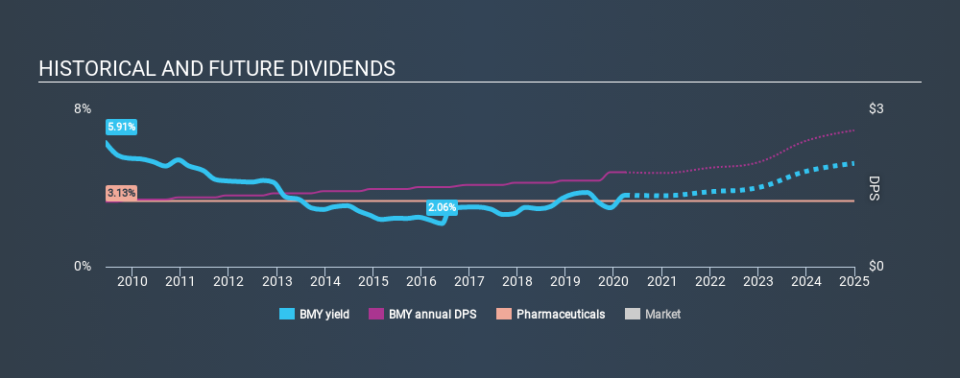Is It Smart To Buy Bristol-Myers Squibb Company (NYSE:BMY) Before It Goes Ex-Dividend?

Some investors rely on dividends for growing their wealth, and if you're one of those dividend sleuths, you might be intrigued to know that Bristol-Myers Squibb Company (NYSE:BMY) is about to go ex-dividend in just 4 days. Investors can purchase shares before the 2nd of April in order to be eligible for this dividend, which will be paid on the 1st of May.
Bristol-Myers Squibb's upcoming dividend is US$0.45 a share, following on from the last 12 months, when the company distributed a total of US$1.80 per share to shareholders. Based on the last year's worth of payments, Bristol-Myers Squibb has a trailing yield of 3.4% on the current stock price of $52.79. If you buy this business for its dividend, you should have an idea of whether Bristol-Myers Squibb's dividend is reliable and sustainable. So we need to investigate whether Bristol-Myers Squibb can afford its dividend, and if the dividend could grow.
View our latest analysis for Bristol-Myers Squibb
If a company pays out more in dividends than it earned, then the dividend might become unsustainable - hardly an ideal situation. It paid out 83% of its earnings as dividends last year, which is not unreasonable, but limits reinvestment in the business and leaves the dividend vulnerable to a business downturn. We'd be concerned if earnings began to decline. Yet cash flow is typically more important than profit for assessing dividend sustainability, so we should always check if the company generated enough cash to afford its dividend. Thankfully its dividend payments took up just 37% of the free cash flow it generated, which is a comfortable payout ratio.
It's positive to see that Bristol-Myers Squibb's dividend is covered by both profits and cash flow, since this is generally a sign that the dividend is sustainable, and a lower payout ratio usually suggests a greater margin of safety before the dividend gets cut.
Click here to see the company's payout ratio, plus analyst estimates of its future dividends.
Have Earnings And Dividends Been Growing?
Companies with consistently growing earnings per share generally make the best dividend stocks, as they usually find it easier to grow dividends per share. If earnings decline and the company is forced to cut its dividend, investors could watch the value of their investment go up in smoke. Fortunately for readers, Bristol-Myers Squibb's earnings per share have been growing at 11% a year for the past five years. The company paid out most of its earnings as dividends over the last year, even though business is booming and earnings per share are growing rapidly. Higher earnings generally bode well for growing dividends, although with seemingly strong growth prospects we'd wonder why management are not reinvesting more in the business.
Another key way to measure a company's dividend prospects is by measuring its historical rate of dividend growth. Bristol-Myers Squibb has delivered an average of 3.8% per year annual increase in its dividend, based on the past ten years of dividend payments. It's good to see both earnings and the dividend have improved - although the former has been rising much quicker than the latter, possibly due to the company reinvesting more of its profits in growth.
Final Takeaway
From a dividend perspective, should investors buy or avoid Bristol-Myers Squibb? Bristol-Myers Squibb's growing earnings per share and conservative payout ratios make for a decent combination. We also like that it paid out a lower percentage of its cash flow. There's a lot to like about Bristol-Myers Squibb, and we would prioritise taking a closer look at it.
In light of that, while Bristol-Myers Squibb has an appealing dividend, it's worth knowing the risks involved with this stock. To help with this, we've discovered 5 warning signs for Bristol-Myers Squibb (1 is a bit concerning!) that you ought to be aware of before buying the shares.
If you're in the market for dividend stocks, we recommend checking our list of top dividend stocks with a greater than 2% yield and an upcoming dividend.
If you spot an error that warrants correction, please contact the editor at editorial-team@simplywallst.com. This article by Simply Wall St is general in nature. It does not constitute a recommendation to buy or sell any stock, and does not take account of your objectives, or your financial situation. Simply Wall St has no position in the stocks mentioned.
We aim to bring you long-term focused research analysis driven by fundamental data. Note that our analysis may not factor in the latest price-sensitive company announcements or qualitative material. Thank you for reading.

 Yahoo Finance
Yahoo Finance 
